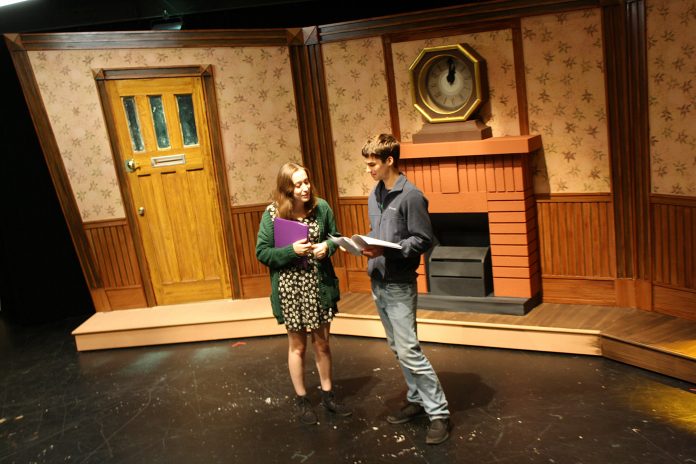Tick tick tick.
Tall and lanky, limbs covered by black sweatpants and a purposely oversized black overcoat, Brydon Geisler ‘18 eyes dart from couch to couch trying to identify the people he’s supposed to meet. His search is hindered by sorority girls gossiping where the meeting was scheduled to occur and the hustle and bustle of Java Joe’s at seven o’clock which feeds evening caffeine and procrastination to the students just trying to survive at the halfway point of the semester. Geisler lets his thumbs fidget. Eyes still scan.
Tick tick.
“When we move on to the next scene, remember to keep it open, sort of, what am I looking for, sing-songy.”
After waiting patiently for the faculty advisor to read off his notes and leave the room, Geisler leans forward onto his elbows and looks his small cast in the eye, indirectly.
“Think about choosing silences rather than letting them happen to you.”
He’s got notes of his own. They’re not written on any legal pad but rather captured in his head and he moves from one suggestion to the next, elaborating on the ones he only thinks need mention. Like an elevator, he skips over several floors to get to his final destination, which in this rehearsal focuses on the impact he wants his play to have.
After all, as a senior, this isn’t just any other play — this is a culmination of Geisler’s four years in Muhlenberg’s theater department.
Tick tick tick.
He sits by the fireplace in Seegers Union, body weight supported by his elbows much like in his rehearsal. Geisler’s out of his element, avoiding the eye contact he so confidently held just a couple weeks earlier. While his ability to command the room has gone backstage, he rarely stumbles over a question about his upcoming play.
What will stand out most, according to Geisler, is that The Bald Soprano is everything Muhlenberg theater is not.
“A lot of the theater program at Muhlenberg, at least technically in classes and structure, focuses heavily on naturalism and realism. The Bald Soprano is not. I had to start from scratch and me and the cast and crew all had to learn what the story is and what part to tell.”
The Bald Soprano finds its origins in the theater of the absurd. What it is supposed to represent is not overwhelmingly apparent, but many critics suggest that it expresses how meaningless and mundane communication is in current society.
Tackling issues that like through theater can be difficult enough, without being a student directing other students.
But Geisler welcomes the challenge.
“Directing other students actually allows for more opportunity for it to truly be a student production,” said Geisler. “It’s a lot less authoritarian and more collaborative. I don’t have time to choreograph every little moment, so there’s a lot of leeway in general between me and the actors.”
For Geisler, whose start in theater began at a summer camp and morphed into using theater as social change, hopes that the subtly comical and absurd play will provoke conversation. The content of the play itself has the possibility to do so but only time will tell if the shy, self-underrating senior has what it takes to produce a powerful portrayal of the absurd.





















